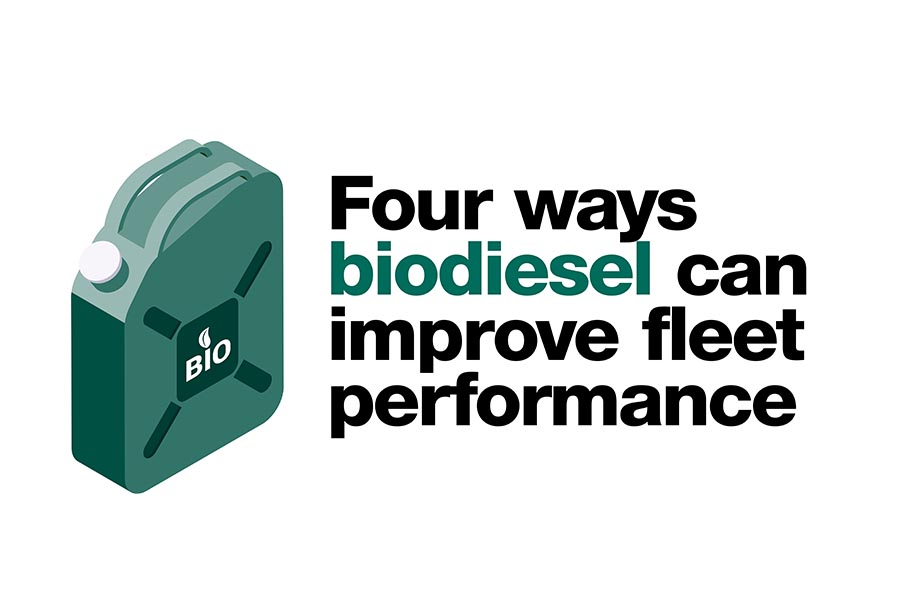Performance benefits of biodiesel
By Cummins Inc., Global Power Technology Leader

Biodiesel is one lower-carbon alternative fuel available for customers to integrate into their fleet’s engines today. It’s often referred to as a cleaner-burning alternative to that of petroleum diesel, created from renewable feedstocks, including vegetable oils, animal fats and used cooking oil. This lower-carbon fuel reduces emissions while maintaining similar performance characteristics to that of diesel.
In this article, we’ll break down key ways biodiesel can improve a fleet’s operations and performance.

#1 Performance | Cetane
When it comes to evaluating what fuel type will perform best for a customer's fleet, it's important to consider the quality. For this, customers will want to review the cetane rating.
Cetane rating is one measure of fuel quality or a measure of ignition quality. This measurement runs on a scale of 0 to 100 and serves as an indication of how well a fuel will burn within the engine cylinder. The higher the cetane number, the shorter the ignition time, meaning better combustion.
Diesel engines today require fuel with a cetane number ranging from 40-45; biodiesel, however, requires a minimum cetane number of 45. Depending on the biodiesel blend, the cetane number could range anywhere from 45-55.
When considering life cycle emissions calculations, biodiesel's higher cetane number is an indication that the fuel ignites more readily in the engine, leading to improved start-up performance, smoother and quieter running conditions all while lowering carbon emissions. Improved start time is particularly advantageous for customers operating in cold conditions.
#2 Quality | Lubricity
Modern diesel engines rely on fuel to lubricate and provide wear protection to the fuel system components like high pressure pumps and injectors. Proper lubricity management can help ensure engines run smooth, cooler and quieter.
In traditional diesel today, however, sulfur content and aromatics have been removed as a result of regulations to create ultra-low-sulfur diesel (ULSD), which eliminates most of the lubricity in the fuel. Because of its oxygen content, biodiesel - even at low blends - has a higher lubricity. Blending as little as 2% biodiesel replaces that lubricity in diesel fuel.
Although all original equipment manufacturers (OEM) approve the use of B51, vehicle owners should consult their OEM to determine the optimal biodiesel blend for their specific needs.
#3 Low initial cost of adoption
Integrating biodiesel into customer's fleets today is fairly easy given the fuel's compatibility with most Cummins diesel engines. Additionally, because biodiesel is produced domestically in the United States, it has an established fuel infrastructure.
In most cases, biodiesel blends can be used as a direct substitute for conventional diesel without necessitating modifications to vehicles or fueling infrastructure. This compatibility extends to the vast array of diesel engines in operation today, from light-duty vehicles to heavy-duty trucks.
All of Cummins' automotive and industrial engines are compatible with B5 (5% biodiesel, 95% petroleum diesel). Most Cummins diesel engines are compatible with biodiesel blends up to B20. All on-highway engines are also B20-approved. The ease of integration into existing fleets allows customers to leverage the environmental benefits of biodiesel immediately, without incurring significant upfront costs of engine modifications or new infrastructure investments.
The operational costs associated with transitioning to biodiesel can be lower compared to other alternative fuels, which is particularly appealing for customers looking to reduce emissions and comply with environmental regulations without substantial capital investment. Moreover, the growing availability of biodiesel through the existing network of fuel stations in the United States ensures a reliable supply and convenience for customers aiming to make the transition to cleaner fuel alternatives.
The reduction in GHG emissions and pollutants associated with biodiesel use can lead to potential savings in carbon-related costs and compliance with environmental regulations. These environmental and economic benefits combined position biodiesel as a compelling option for customers seeking to achieve sustainability goals while maintaining financial prudence.
#4 Lower carbon intensity
Biodiesel is a lower carbon fuel with significantly lower engine emissions than ULSD. The adoption of biodiesel significantly lowers greenhouse gas emissions, namely CO2, by recycling carbon through the growth of its feedstocks.
According to comprehensive life-cycle analyses, using pure biodiesel (B100) can slash CO2 emissions by upwards of 74% compared to petroleum diesel2. Even modest blends of biodiesel, such as B20, are capable of reducing CO2 emissions by about 15%. Biodiesel’s higher combustion efficiency means fewer carbon, particulate matter and other pollutant emissions.
Biodiesel is one fuel helping customers on their journey to lowered emissions and a better planet.
Compatibility with Cummins engines
A wide range of Cummins engines are approved for use with B20 biodiesel. The on-highway engines that are compatible with B20 include the ISX, ISM, ISL, ISV5.0, and ISB engines built after January 2007, as well as the ISX CM570 built after January 2002. For off-highway applications, Cummins has approved models such as the QSK, QSX, QSM, QSL, QSC, and QSB series built after January 2007, including the Cummins MerCruiser™ Diesel Marine engines produced after 2007.
What does this mean? Customers and their businesses powered by Cummins’ engines can easily adopt biodiesel, maintaining operational efficiency and achieving more sustainable operations. Cummins’ HELM™ platforms, tailored to support the use of cleaner-burning renewable fuels, is a key facet of our dedication to leading the transportation industry towards a more sustainable and environmentally friendly future.
Reach out to us at Cummins to learn how we can partner to help your fleet adopt biodiesel and achieve more sustainable operations without sacrificing performance.
[1] https://afdc.energy.gov/vehicles/diesel#:~:text=Diesel%20engines%20depend%20on%20the,of%20biodiesel%20use%20in%20vehicles.
[2] https://afdc.energy.gov/fuels/biodiesel_benefits.html
Author Profiles

Cummins Inc., Global Power Technology Leader
Cummins Inc., a global power solutions leader, comprises five business segments - Components, Engine, Distribution, Power Systems, and Accelera by Cummins - supported by its global manufacturing and extensive service and support network, skilled workforce and vast technological expertise. Cummins is committed to its Destination Zero strategy - the company's commitment to sustainability and helping its customers successfully navigate the energy transition with its broad portfolio of products. Cummins has approximately 69,900 employees and earned $3.9 billion on sales of $34.1 billion in 2024. See how Cummins is leading the world toward a future of smarter, cleaner power at www.cummins.com.
Related Tags